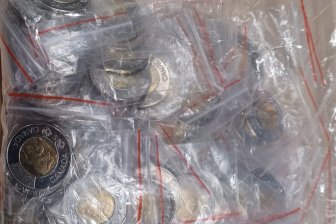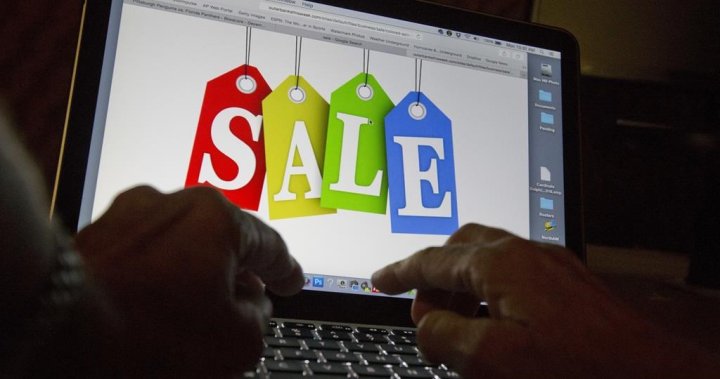An arrest and huge seizure of 26,000 allegedly counterfeit $2 coins in Quebec, and a second smaller seizure of the same dodgy coins in a northern Ontario city a few months later, suggests that a new counterfeit toonie variety is circulating across Canada, a coin expert says.
Global News learned about a new variety of fake toonie while researching the case of the Quebec man who is facing criminal charges for an alleged attempt to import more than 26,000 dodgy toonies from a coin maker in China, paying a nickel a piece for them, plus shipping, court records state.
A Canada Border Services Agency customs officer seized 12,000 alleged fake toonies at a FedEx warehouse at the Montreal-Mirabel International Airport in January.
CBSA investigators later found another 14,000 when they raided the home of the suspect in that case, Jean-Francois Généreux, from Sorel, Que., about 70 kilometres from Montreal.
Last week, the CBSA shared with Global News, for the first time, some digital photos of the 26,000 seized $2 coins that were allegedly ordered from China and circulated in Quebec.
At the same time, police in Sault Ste. Marie, Ont., confirmed that they arrested a local person who had a smaller number of the same counterfeit coins in their possession in March, and seized 15 coins.
Counterfeit Canadian coin expert Mike Marshall of Trenton, Ont., who examined images of both sets of seized coins for Global News, said they appear to come from the same manufacturer.
Both the Quebec and Ontario fake coins are stamped 2012.
They both appear to have the same differences that allow experts like Marshall to spot them as counterfeits when compared with authentic $2 coins of that same year.
Marshall said the new $2 fake coins do look real at first glance, but the counterfeits have several distinguishing features that ordinary consumers can spot, including:
- The Queen’s nose is too sharp and long on the fake coin’s head side.
- Above the Queen’s head, a maple leaf-shaped security feature appears on the fake coin that does not appear on genuine toonies from 2012.
- On the polar bear side of the fake coin, a “$” symbol appears between two maple leaf-shaped security features. On the real coin, the numeral “2” actually appears in that spot.
- Also on the polar bear side, on the right side near the bear’s head, the word “CANADA” appears on the fake coin. On the real coin, the word “DOLLAR” appears in that space.
- Lastly, the “2012” year on a real toonie appears in a straight line, while the same numbers appear on a curve or slight arc on the counterfeit coins.
The 26,630 allegedly counterfeit Quebec coins were seized at Mirabel airport on Jan. 9, at Généreux’s home in Sorel on Feb. 1 and inside a storage locker on his property on Feb. 7, the CBSA stated in search warrants filed in Quebec court. Généreux is now facing criminal charges.
Sault Ste. Marie police spokesperson Lincoln Loulitt confirmed in an email that Sault officers also seized 15 of these fake coins in the northern Ontario city on April 13 after a person was arrested.
Loulitt did not reveal further details about that arrest, but said in his email that Sault police have not seen any more dodgy toonies since officers seized those 15 counterfeit $2 coins.
The fake coins circulating in Sault Ste. Marie were first publicly revealed by Mike Turcotte, the co-owner of Vintage Games N Junque, a retailer in the Sault that sells coins and collectibles.
Turcotte said he spotted them himself only because he was an avid coin collector for 20 years.
“It’s a crazy idea to make fake toonies, but it’s such a genius scam because who’s going to waste their time going through their change looking for fakes?” Turcotte added.
Turcotte posted photos of the dodgy coins on a social media account after they landed in his till. He then shared that news with Soo Today, which published a story about them in May.
In an interview with Global News, Turcotte said he has since figured out exactly where his first fake toonie came from. His store received it from a youth who spent it after he had received it from his grandfather, so the fakes are circulating in the community, Turcotte said.
The youth later called back to apologize, not knowing the coin was fake when he spent it, Turcotte said.
Marshall said he doesn’t know if the coins from the Quebec man circulated west and north to the Sault or whether the suspect in Sault Ste. Marie made a small order from China as a trial experiment from the same coin maker in China selling them online.
“If that guy in the Sault bought only 15, it was likely a feeler operation. See if you can pass them, and then if you can, you make a bigger order,” Marshall explained.
Marshall feels the Chinese coin maker of the new fake made minor changes to a genuine Canadian circulated coin but included features to make it identifiable, almost leaving fingerprints.
“But he’s made it similar enough that secondary buyers can attempt to pass it off as real,” Marshall said. “I can pass them all day long because nobody looks at their change.”
Marshall says this new variety of toonie is different than the so-called “camel-toe toonie,” another fake variety of the $2 coin that has been traced back to the Greater Toronto Area.
In 2022, the RCMP arrested Daixiong He, 68, of Richmond Hill, Ont., after seizing 10,000 counterfeit toonies that were circulating in the Greater Toronto Area. He was charged with uttering and possession of counterfeit money.
Marshall said “camel-toe toonies are easily identifiable because the polar bear’s right toes are far different than the genuine coin’s design.”
© 2023 Global News, a division of Corus Entertainment Inc.




